The drive for sustainability is remaking companies, supply chains, and economies. This profound business transformation comes as companies are also grappling with the potential impacts of generative AI , new regulations, and more. So how are boards of directors meeting the sustainability challenge?
BCG, INSEAD, and Heidrick & Struggles have teamed up to find out. We cast a wide net with a global survey reaching 879 respondents in 19 industries and a series of roundtables involving more than 200 directors. We found that boards are adapting, making changes to how they approach their own composition, their governance and process considerations, and the metrics they track. But they also continue to wrestle with challenges, most notably how to integrate sustainability fully into company strategy. Although the majority of respondents say that sustainability considerations should be fully integrated into business strategy , only a minority report that is the case today.
How Sustainability Is Reshaping the Work of Directors
There is an undeniable shift today in the expectations for the role of business in society. Trust in government has ebbed—and people are increasingly looking to business to lead the way in addressing major societal challenges . At the same time, regulations, including the Corporate Sustainability Reporting Directive in Europe and the universal proxy introduced by the Securities and Exchange Commission in the US are upping requirements around transparency and accountability.
Yet despite greater attention to meeting societal expectations, most boards do not feel financial pressure to act on sustainability issues. The majority of respondents—68%—report that sustainability is having no effect or only a slight impact on the company’s financial performance today.
There are, however, other factors driving board action. Just over half of the directors in our survey cite increasing legislative and regulatory requirements as a key driver of company efforts to address sustainability with a similar share saying they are acting because it’s the right thing to do. (See Exhibit 1.)
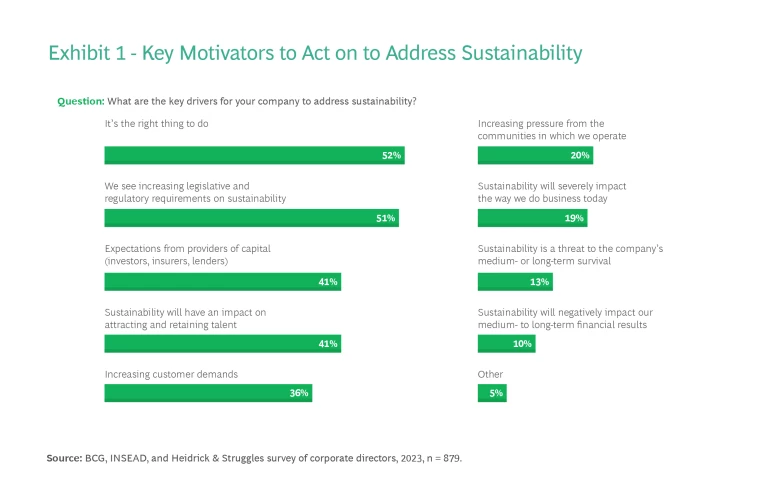
The effort to address sustainability is having a direct impact on how boards operate, with more than two-thirds of respondents (69%) reporting that demands on their time are increasing. (See Exhibit 2.) Not surprisingly, the share was higher for directors in the energy (77%) and finance and insurance (74%) sectors, two sectors in which balancing the world’s need for more energy with climate change is creating significant new risks and opportunities.
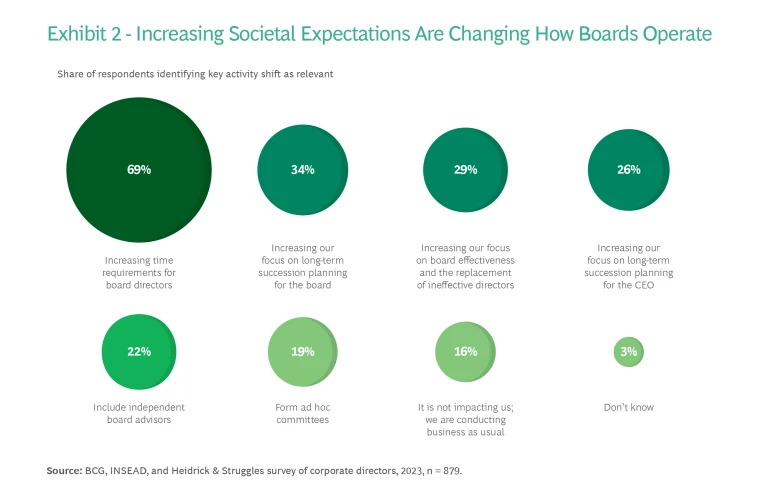
A strong majority (79%) say their board has a very or entirely clear understanding of the strategic opportunities and risks sustainability presents—but only 29% completely agree they have sufficient knowledge to effectively challenge management on sustainability plans and ambitions and exercise oversight on their execution. (See Exhibit 3.)
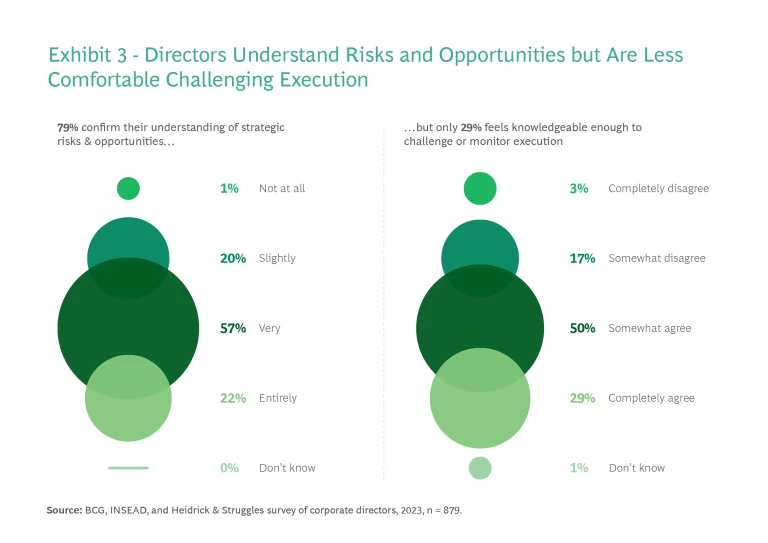
In our survey of directors published last year, we asked respondents what area they would like to see explored in-depth in our upcoming work, and the most common response was to focus on how boards can effectively embed sustainability into corporate strategy . So this time around, we asked respondents the extent to which sustainability considerations are currently integrated into the board agenda, engagement with stakeholders, investment decisions, risk, business strategy, and assessment of business opportunities—and what the optimal degree of integration should be.
The greatest share—66%—say that sustainability considerations should be fully integrated into business strategy. But just 38% report that is the case today. And although roughly half also say that sustainability should be entirely integrated into the board agenda and investment decisions and asset allocation, less than 30% report that is happening currently. (See Exhibit 4.)
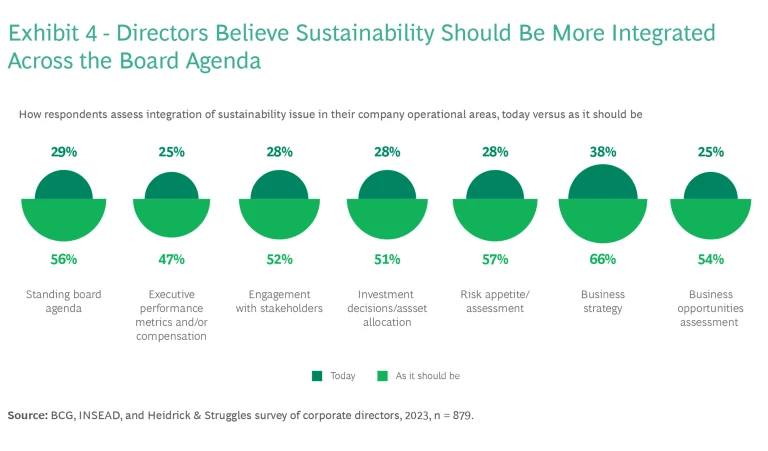
When asked what was blocking them from spending meaningful time on strategic thinking about sustainability, more than 72% of directors cite the need to devote time to non-sustainability related, high-priority topics. Other obstacles include the lack of knowledge about long-term implications of sustainability and the need for short-term sustainability matters to take priority. (See Exhibit 5.)
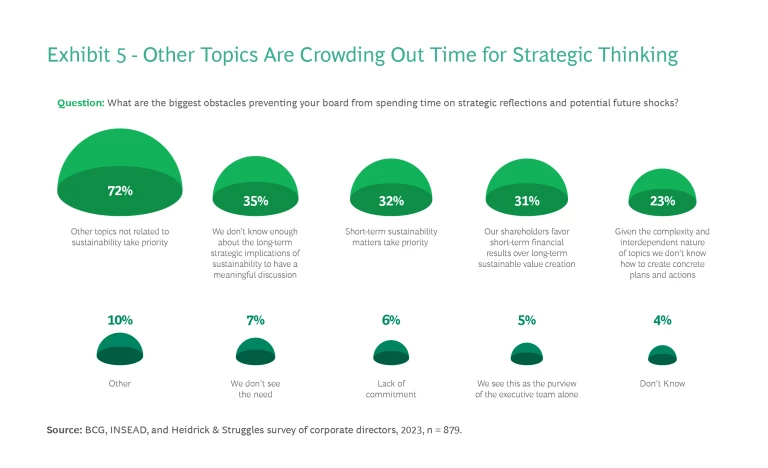
Blending Sustainability and Strategy
Despite the complexity of fully integrating sustainability into strategy and board operations, there is a clear path forward.
- Sharpening Governance. Boards have an opportunity to refresh their membership, improve transparency on board composition and practice, expand their knowledge on fast-moving topics (including through seeking more information from independent and external experts) and by carving out more time for deep strategic thinking. “Boards should spend 20% of their time on today, 20% on tomorrow and 60% on the day after tomorrow,” a participant in one of our roundtables noted. “Instead, I see most spending 40% on today and 60% on yesterday.”
- Digging Deep on the Issues. It is critical that directors move behind general, high-level discussion and gain in-depth knowledge to fully understand how the world is changing and how that will impact their business and their role. In our work, we see four areas in which boards should more deeply engage with management. First, they can challenge management to set a strategic ambition for sustainability that reimagines how the company can achieve peak value and impact. Second, they can assess how well the company understands the prospect of scarcity for critical inputs for sustainable operations and offerings—and whether it has plans to seize the opportunities in addressing those scarcities. Third, the board can play a critical role in helping companies assess and shape their business ecosystems that support and advance sustainability. Fourth, the board can push to understand the speed with which the company must drive its sustainability transformation—and support management in accelerating action where needed.
- Modeling Strong Personal Leadership. Strong personal leadership in the boardroom is more important than ever. Building a sustainable business is not about tinkering on the edges or looking for compromises that try to satisfy all stakeholders. Directors are called upon to “break the ties,” during this complex transformation, providing clear guidance on the tough choices faced by management. And they must simultaneously help bridge the divisions that inevitably emerge from making such choices.
Companies—and by extension the boards that lead them—can play a critical role in addressing the full spectrum of environmental and social issues facing society while also building durable competitive advantage. In the end, real change is driven by competence, character, courage, and the resilience to follow through on the choices that have been made.
INSEAD
The INSEAD Corporate Governance Centre (ICGC) is engaged in making a distinctive contribution to the knowledge and practice of corporate governance globally. Its vision is to be the leading center for research, innovation, and impact in the field. Through its educational portfolio and advocacy, the ICGC seeks to build greater trust within the public and stakeholder communities, so that businesses are a strong force for improvement, not only of economic markets but also for the global societal environment.










